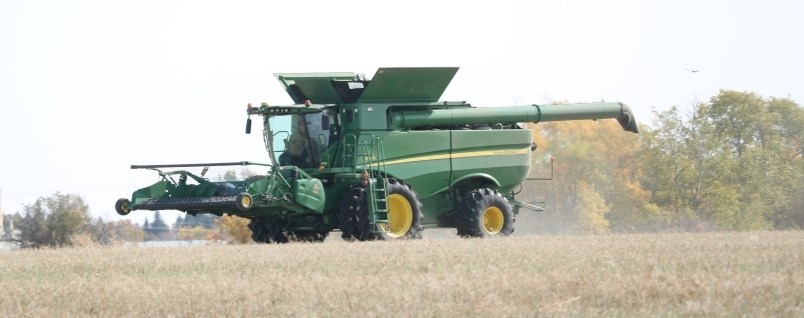MOOSOMIN - Saskatchewan exported a record value of agriculture exports in 2021 as higher prices more than made up for lower production due to drought conditions.
Saskatchewan’s agricultural exports were worth $17.5 billion in 2021, which set another new record for the province.
The 2021 total was an increase of almost seven per cent over the record of $16.4 billion set in 2020, which itself surpassed the previous year by 27 per cent.
Leading agri-food export commodities in 2021 continue to be canola seed, canola oil, non-durum wheat, lentils, durum and dry peas, with top international market destinations including the United States, China, Japan and Mexico.
“These record export numbers show Saskatchewan is in a strong position to continue producing and supplying the world-class agricultural products a growing world wants and needs,” Trade and Export Development Minister Jeremy Harrison said.
“Our growing export base is creating economic opportunity, good jobs and generating investment for communities across the province.”
Agri-food exports represented nearly half of Saskatchewan exports in 2021, valued at $37.1 billion. Saskatchewan overcame challenges including infrastructure disruptions due to adverse weather events in British Columbia to remain one of Canada’s leading agri-food exporters, with a global reputation as a consistent supplier of safe, high quality, sustainability-produced agri-food products.
Saskatchewan exported more than $2.6 billion in each of its key crop product sectors—cereal grains, oilseeds, pulses and edible oils—in 2021.
Compared to 2020, canola oil saw an increase of over 50 per cent, with exports to the United States increasing 72 per cent from $1.1 billion to $1.9 billion.
Canola oil to Â鶹ÊÓƵ Korea also experienced a dramatic increase of 106 per cent from $71 million to $146 million.
“Saskatchewan’s agriculture industry is, and has always been, a significant part of our economy - with an impact that extends far beyond our provincial borders,” Agriculture Minister David Marit said.
“Our producers have fed the world for generations, and we continue to enable the innovation necessary to keep feeding the world’s growing population, expected to be 10 billion people by 2050. These export figures prove once again that we’re up to that challenge and well on the way to meeting the future goals we’ve set.”
Saskatchewan has grown its agricultural exports by more than 56 per cent since 2012.
The province’s ongoing international market expansion plans are progressing with the establishment of new trade and investment offices in the United Kingdom, United Arab Emirates, Mexico and Vietnam in addition to existing offices in Japan, India, China and Singapore.
The value-added processing and agriculture sectors are major components of Saskatchewan’s Growth Plan goals, which include increasing crop production to 45 million tonnes, agriculture exports to $20 billion, and value-added revenue to $10 billion by the end of this decade.
The most recent example of progress toward these targets includes the announcement by Federated Co-operatives Ltd. of their plans to develop a renewable diesel facility as well as a canola crushing plant in Regina, in partnership with AGT Foods, with a capacity of 1.1 million tonnes and combined economic benefits estimated at $4.5 billion.
Saskatchewan has the second-highest GDP per capita in Canada, second only to Alberta.
Minister Marit spoke about what he expects the records of crops to be like in the future.
“We’re hoping to achieve very significant numbers, our growth strategy is we want to hit 45 metric tonnes by 2030. When you look at that number alone just on the food production side and the livestock side of things, you’ll see $3 billion there as well,” said Marit.
“When you see those numbers of production of the livestock side as well, you’re obviously going to see an increase in the value of that trend, so you’ll see those dollars increase as well.”
“What it really means is that agriculture always has and always will be a leading industry in this province. When you look at what global companies are doing and the record investments they made into this province, these are significant investment dollars that these companies are making in this province, to increase value added production.”
“I think what it recognizes is that global companies and countries around the world, have recognized that there’s a huge opportunity in the food production side from the province of Saskatchewan, that’s what it tells me.”





